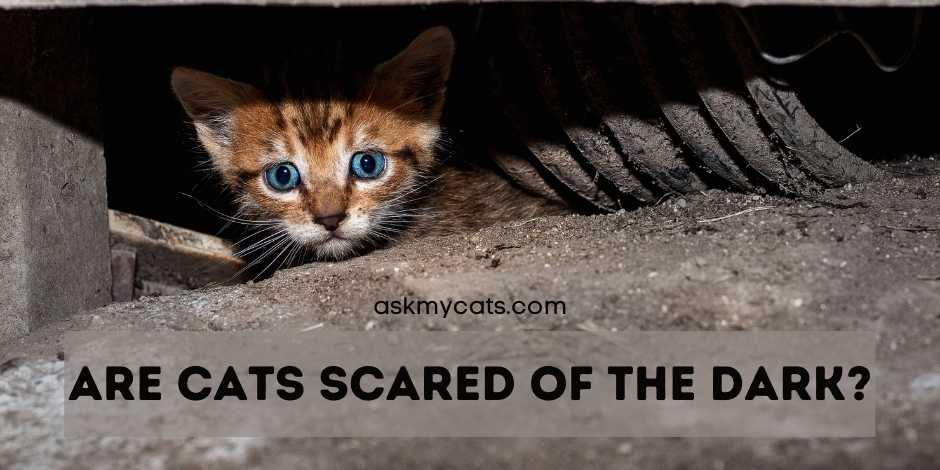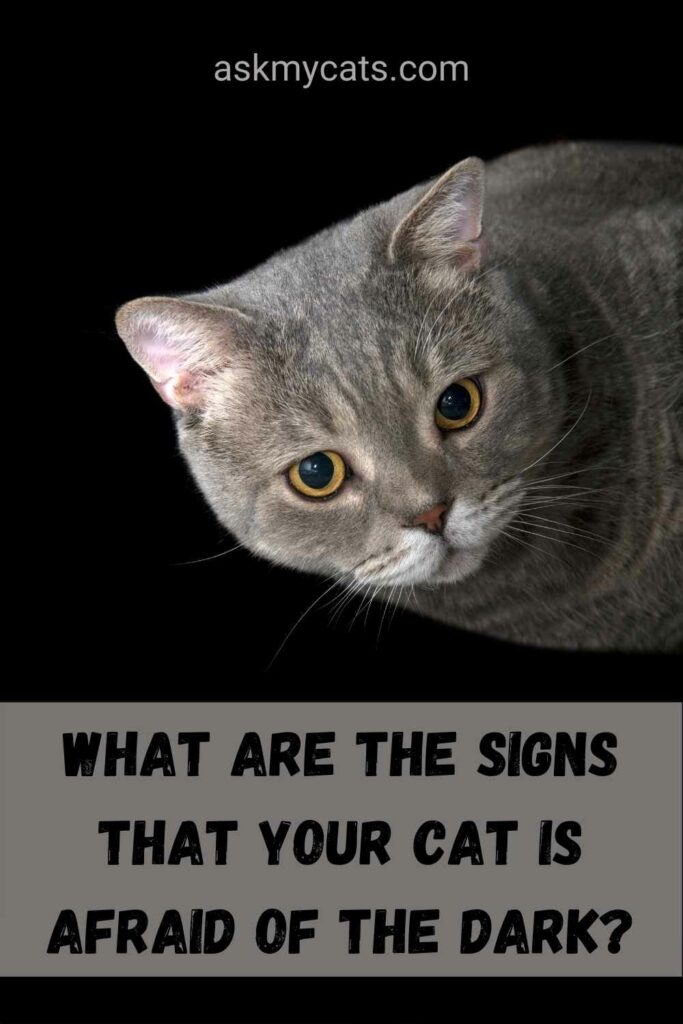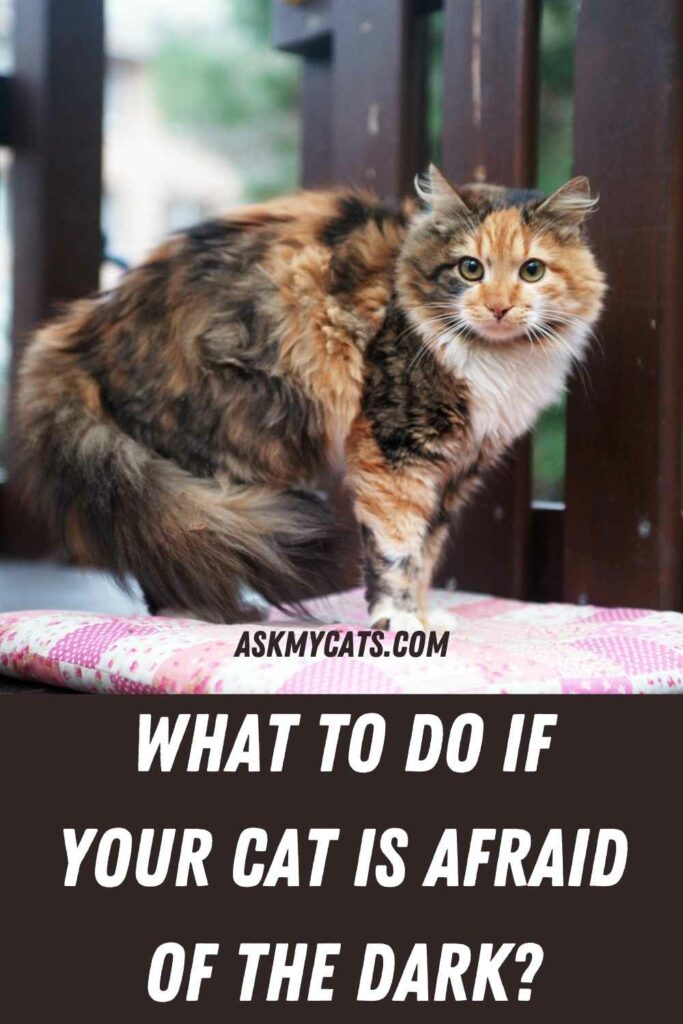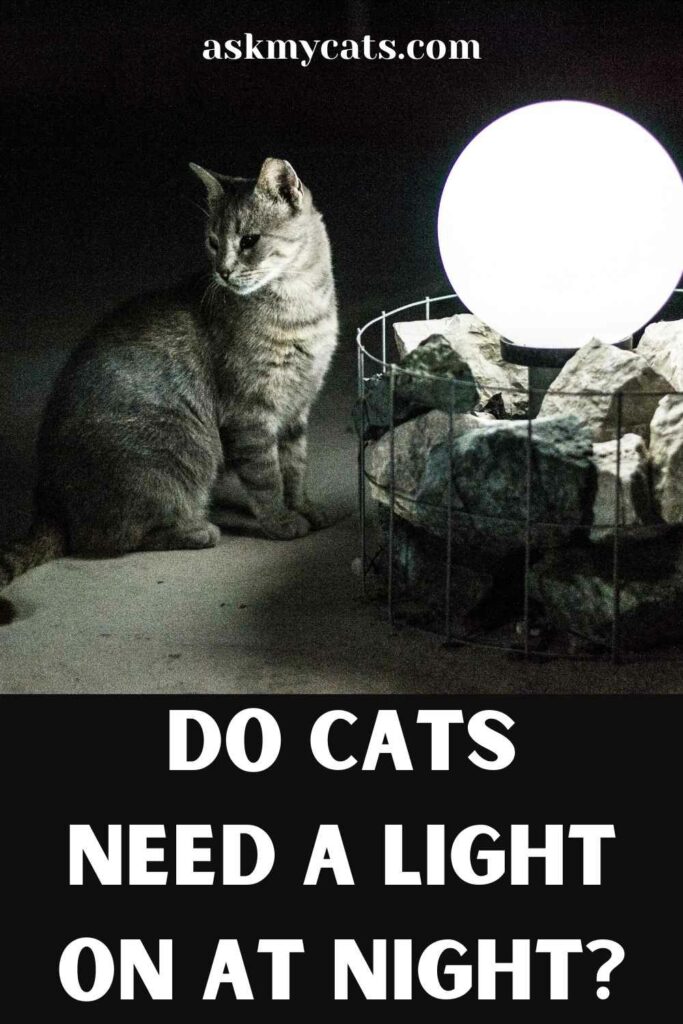Cats are nocturnal predators who hunt at night. They have excellent night vision and a strong sense of smell. Despite the fact that cats are active at night and have excellent night vision, they dislike absolute darkness.
Cats can be scared of the dark, but not all of them are. The dread may be founded on a negative connection with the dark, such as being hunted, captured, abused, or injured.
A cat might have been assaulted by another animal, abused by a person, or thrown out of the house in the middle of the night. She might possibly be suffering from a medical issue such as night blindness.


Give Your Cat the Perfect Day
Get the Free Ebook!
What Are The Signs That Your Cat Is Afraid Of The Dark?
Fear in cats, as in people, is primarily determined by personality.
A cat’s fear can be triggered by a variety of factors, including an unfamiliar location, an aggressive dog, or loud noises, to name a few.
Fear can make certain cats act in an unusual way. In self-defense, they might freeze or stay anchored to the ground, while others can become extremely aggressive.
Physical threats, on the other hand, are blamed for these reactions.

1. Intense Cry
When the lights are turned out, a cat that has been overcome by darkness will begin to weep in despair.
You should be concerned about your tiny companion if you see a pattern of fumbling about and frightening screams every time the light goes off.
In an ideal world, a cat would want to be active and comfortable in the dark.
If you’ve established that your cat is afraid of the dark, it’s conceivable that your cat has been exposed to terrible situations after dark and is still traumatized.
It’s also conceivable that your cat’s night vision is being affected by a medical issue. When the light goes off, a cat who is scared of the dark may start stumbling around and whimpering. This is odd because cats are generally active and at ease in the dark.
2. Dilated Pupils
Dilated pupils are another symptom that your cat is terrified out of its mind when night falls. Fear appears physiologically in cats, just as it does in people.
When cats are stricken by fright or stimulated, their slit pupils are naturally intended to widen and become rounder.
The purpose of the expansion is to collect more light and improve eyesight. Pupils that are dilated appear blacker and empty.
Dilated pupils are common in cats that are afraid of the dark. Pupils expand to collect more light and improve vision, and they look black.
3. Wet Paw Prints
When humans are overcome with dread, we sweat, and cats do the same when they are stressed.
The sweat glands of a cat are strangely located under the pads of its paws, which is why you should be wary of moist paw prints.
When cats are terrified, they sweat abundantly, much like humans. They have sweat glands in their paw pad, which explains why they leave moist paw impressions.
4. Increased Heart Rate
Cats’ heart rates range from 120 to 140 beats per minute on average, but when they are scared, they can reach 180 beats per minute.
The heart rate of a scared cat will increase to a hammering level. A cat’s heart rate should be between 120 and 140 beats per minute on average.
When a cat is immobilized by terror, its pulse speeds up to 180 beats per minute.
You will also like to know about should i leave a light on for my cat
Is It OK To Leave Cats In The Dark?
It is not ok to leave cats alone in the dark if they are terrified of being alone or in the dark.
Some cats are afraid of the dark at night because it reminds them of a negative experience in their life, such as being abused or being attacked by dogs. Despite their excellent night vision, cats still require some light to see.
They can see in dim light, although this varies from one cat to the next. Some cats may have physiological issues with their eyes that result in poor night vision.
Even while kittens can see in low light, it’s still a good idea to keep a night light on for her, especially if she’s new to your house. A nightlight might assist her in acclimating to her new surroundings.
Also, check out about can kittens see in the dark
If you must leave her alone in the evening or even overnight, it is a good idea to turn on at least one light in the home for her. Additional ideas include utilizing lights or nightlights with built-in light sensors.
While it becomes dark, they will turn on the lights, providing illumination for your pet when it’s dark outside. Motion-activated lights are another option, as they can provide enough light for cats to move about.
Your cat will appreciate it if you leave a light on for her. For starters, you won’t trip over her when you arrive home, and she’ll be waiting for you at the door to meet and welcome you back!
Furthermore, even night lighting will make it safer for your cat to navigate the house at night. She’ll also be a bit more active before you come home, and she’ll be ready to sleep.
What To Do If Your Cat Is Afraid Of The Dark?
To assist your cat to overcome his fear of the dark, place a low light or night light in the room where he sleeps and see if it helps.

If she is still afraid, you can put her bed in the corner of your room so she can sense your presence. You may also let her sleep in your bed.
Create hiding places for your cat to retreat to anytime she feels threatened, regardless of the time of day or night. You may also use a Feliway pheromone diffuser to assist your cat to relax. If your cat is still scared of the dark after following these instructions, take her to the doctor so he can examine her health.
There are a few things you may do to help your cat overcome his or her dread of the dark. To begin, try putting low light into the cat’s sleeping area to see whether it makes a difference.
Do not leave the cat alone if he still feels vulnerable and afraid. Make a special bed for it in the corner of the room, or let it share your bed.
You may also try to create areas where your cat can hide if he or she is afraid.
Consider using a pheromone diffuser to help your anxious cat relax.
If the anxiety persists, make an appointment with your veterinarian since there might be a significant problem with your cat’s vision.
Excessive eye discharge, discolored eyes, or abnormally dilated pupils are all warning signals.
When your cat screams in the dark, always comfort it. Do whatever it takes to get it to stop weeping and start purring.
Also, check out Are Cats Scared Of Thunder & Lightning?
Can Cats See in the Dark?
The quick answer is that it isn’t quite right. Cats, contrary to popular belief, do not have their own pair of night vision goggles. They do, however, require some degree of light to see.
They, on the other hand, require only one-sixth of the amount of light that humans do and can see in extremely dim light.
In the rare case when all light is shut off, cats will be unable to see in the dark, but feline vision is far superior to that of humans for all of their night-time excursions.
We’ve always assumed that cats have exceptional night vision because they’re known as night owls, but is this true? With this tutorial, you’ll learn all you need to know about your cat’s night vision.
Cats tend to perform all of their greatest hunting at night. Many cat owners are acquainted with being awakened up by small presents – such as a mouse or even a sock – or with their cats’ frantic night-time runs around the house.
These late-night activities raise the question of whether cats can see in the dark. Many people assume that cats are nocturnal and hence have great vision in the dark, but you might be surprised to hear that cats are crepuscular.
This indicates that they are most active during dawn and dusk. In addition, the photoreceptors in cats’ eyes are not the same as those in humans.
Humans have more cones than cats, which allows them to see colors and sunshine better. Cats have more rods, which are responsible for night vision, peripheral vision, and motion perception.
Cats’ eyes have a large number of rods, which allows them to see better in dim light but not as well as humans in bright light.
A cat’s tapetum, which is a reflecting layer of tissue that reflects light back to the retina, is also present.
This layer of reflecting tissue reflects light back to the sensory cells, allowing the retina to receive almost half of the available light. When you take a shot of your cat with a flash or see their eyes reflected by headlights, the tapetum is partly to blame.
Also, find out more about why is my cat scared of the tv
Do Cats Need A Light On At Night?
No, Cats definitely require some light to see, but not nearly as much as humans.

The eyes of a cat are so sensitive that they only require one-sixth of the quantity of light that we do. Their eyes are incredibly flexible, and they can see at light levels that would leave a person stumbling around blind.
The eyesight of a cat differs significantly from that of a person. Objects appear fuzzy until they’re very close to them, and they have reduced sharpness.
Colour vision in cats is likewise less acute than in humans, resulting in a washed-out, unsaturated view of the world with less red colours.
After nightfall, a cat’s vision truly comes into its own. The night vision of a cat is remarkable. A cat can see perfectly at light levels when a person can barely make out even the haziest shapes. She is adept at avoiding barriers and detecting her prey, as well as avoiding dangers.
The pupil (the dark portion of the eye) can constrict tightly in broad daylight, blocking off unneeded light. In the dark, a cat’s pupil dilates dramatically to make the most of every ray of light.
The shape of a cat’s pupils was frequently used to tell the time in mediaeval Japan because their eyes are so sensitive and receptive to light.
Do Cats Prefer The Dark?
Crepuscular cats are those who like to be awake at dawn and dusk. As a result, they’ve developed a preference for neither total darkness nor intense light.
However, human vision is thought to be at its finest during dawn and dusk. Cats, on the other hand, have more rods than cones in their eyes than humans.
It’s also crucial to remember that cats are light sleepers (we’ve all heard of the “catnap”), which means that while they sleep a lot; they’re also ready to spring into action and be highly active at any time.
Frequently Asked Questions
Can a cat be scared of the dark?
Low light isn’t a problem for most cats. Cats aren’t afraid of the dark in general since they have night vision that is considerably superior to ours. For low-light situations, they have numerous ocular adaptations.
Do cats get scared to sleep alone?
While cats are known for their independence, some may be demanding and pushy. If you can stay asleep during their night-time activities, your bedtime is unlikely to be influenced.
What do cats fear the most?
Loud noises can startle cats, causing them to flee beneath the sofa or bed and trembling. If she is becoming scared, please confine her to a location where the outside noise is less intense. Don’t compel her to eat or amuse her if she doesn’t want to.
Final Words
Cats are nocturnal creatures, night prowlers and stalkers who are at ease in the dark and have highly developed eyesight that allows them to see in the dark better than we do.
It’s possible that your cat may associate light with your presence. It’s possible that this is TV light. It may grow lonely and loud if left in total darkness.
Feel free to leave your questions in the comments section below!
References
- https://pdxpetdesign.com/cat-health/where-should-my-cat-sleep-sleeping-options-and-arrangements-for-cats-and-kittens/
- https://purrcraze.com/is-it-ok-to-put-a-cat-in-a-room-at-night
- https://www.purina.co.uk/articles/cats/behaviour/travel/leave-cat-at-home
- https://www.abc.net.au/science/articles/2005/12/12/1523473.htm
